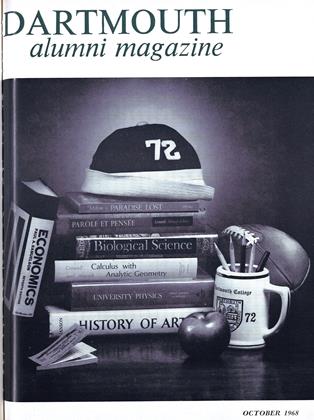By Ronald H. Chilcote '57. Austin:Bureau of Business Research, the University of Texas, 1968. 174 pp. $5.
Dartmouth men familiar with Ronald Chilcote as Professor of Political Science and as the Coordinator of the Latin American Research Program for the University of California, Riverside, may be surprised that he has written a book about Spain. Chiefly interested in the development of industry and emerging nations, he was led to Spain's iron and steel industries by his studies in Portugal, Chile, and Argentina.
Readers may be struck by his extreme brevity. His book on Spain's iron and steel industries runs to only 174 pages including ten of index, no fewer than 17 of highly specialized bibliography, 11 tables of statistics and charts, and seven maps.
A reader may be considerably taken aback by the author's enormous ambitions. Within a few pages he would like to treat what older and more sedate scholars would call the impossible: (1) Developments from the early beginnings, (2) The struggle between the government-controlled industry and private firms, (3) The location of raw materials and markets affecting production, (4) The changing domestic and world markets for raw materials and finished products, (5) The impact of new policy changes, (6) Complex problems in heavy industry and ensuing stagnation when industry cannot keep pace with economic and political changes. The author wants no less than to show how Spanish iron and steel problems are historical, geographical, economic, social, and most important, political.
In so ambitious a monograph as this, the flavor is that of an extended magazine article heavily freighted with statistics. With efficient speed for so extensive a "geopolitical analysis," the field research was completed between January 1960 and August 1961 when Mr. Chilcote visited the integrated iron and steel plants and interviewed company officials there and in Madrid offices.
It is clear that Spain has emerged from the economic stagnation bogging down many underdeveloped nations with low income, chronic mass poverty, and obsolete methods of production and social organization. With statistical richness and analyses so succinct as to be almost overrefined, Mr. Chilcote spells out why Spain is fortunate in her iron ore resources.
 View Full Issue
View Full Issue
More From This Issue
-
 Feature
FeatureTwo Societies, Separate and Unequal
October 1968 By CHARLES F. DEY '52 -
 Feature
FeatureJOHN THORNTON OF CLAPHAM
October 1968 By FRANK W. FETTER -
 Article
ArticleThe Faculty
October 1968 By WILLIAM R. MEYER -
 Article
ArticleWith the Big Green Teams
October 1968 -
 Class Notes
Class Notes1912
October 1968 By DR. STANLEY B. WELD, FLETCHER CLARK JR. -
 Class Notes
Class Notes1921
October 1968 By JOHN HURD, INGHAM C. BAKER
JOHN HURD '21
-
 Article
ArticleMEN VS. MICROSCOPES
December 1947 By JOHN HURD '21 -
 Article
ArticleCancer Pain Reduced Through His Research
December 1948 By JOHN HURD '21 -
 Books
BooksEVERY DOG SHOULD HAVE A MAN.
December 1952 By John Hurd '21 -
 Books
BooksTHE OFFENSIVE GOLFER
FEBRUARY 1964 By JOHN HURD '21 -
 Books
BooksBriefly Noted
MARCH 1971 By JOHN HURD '21 -
 Books
BooksLAUGHTER AND TEARS.
FEBRUARY 1972 By JOHN HURD '21
Books
-
 Books
BooksPUBLICATIONS
May 1925 -
 Books
BooksONE-DIMENSIONAL TWO-PHASE FLOW.
JULY 1970 By ALVIN O. CONVERSE -
 Books
BooksALASKA SOURDOUGH:
February 1951 By CLIFFORD L. JORDAN '45 -
 Books
BooksCATHOLICS IN CONTROVERSY.
April 1955 By FRED BERTHOLD '45 -
 Books
BooksTHE MIND OF CHINA
June 1933 By Robert A. McKennan -
 Books
BooksGENTLEMAN'S PROGRESS: THE ITINERARIUM OF DR. ALEXANDER HAMIL-
March 1949 By Wayne E. Stevens.

